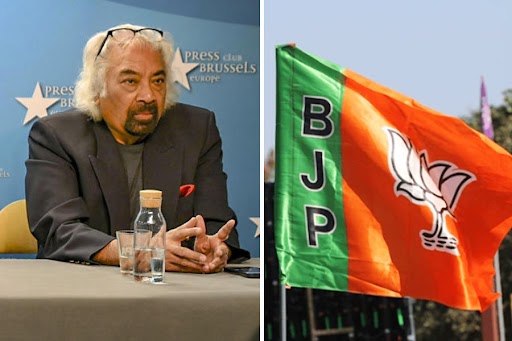Leaders of India’s ruling party, the BJP, on Monday slammed Sam Pitroda for his "China is not our enemy" remark even the Narendra Modi government’s chief economic adviser said earlier this year that Delhi should look at investment from Beijing to boost Indian exports.
"I don't understand the threat from China. I think this issue is often blown out of proportion because the US has a tendency to define an enemy,” Pitroda, a long-time confidant of Rajiv Gandhi and the former prime minister’s family, told the news agency IANS.
“I believe the time has come for all nations to collaborate, not confront. Our approach has been confrontational from the very beginning, and this attitude creates enemies, which in turn garners support within the country. We need to change this mindset and stop assuming that China is the enemy from day one. It's unfair, not just to China, but to everyone.”
The BJP leaders wasted no time in grabbing the political opportunity.
"Sam Pitroda's statement makes it clear that Rahul Gandhi works as an agent of George Soros, Deep State, and China,” Pradeep Bhandari, a spokesperson for the BJP told IANS.
“In his speech in Parliament, he mentioned China 34 times. During the Doklam issue, he was meeting the Chinese ambassador secretly. By giving a cover shield to China and eulogising the MoU that Congress had with China, Sam Pitroda has made it clear that when Rahul Gandhi would have to choose between India and China, he will choose China."
Another BJP leader, Ajay Alok, told news agency ANI: "Sam Pitroda is the mentor of Rahul Gandhi… Rahul Gandhi has also signed a secret treaty with the People's Liberation Party of China. Rajiv Gandhi had taken funds from China. Jawaharlal Nehru gave the Aksai Chin and India's seat in UNSC to China. The friendship between Congress and China is quite old."
However, in the pre-Budget Economic Survey of 2024, chief economic adviser V. Anantha Nageswaran had argued that increased Chinese FDI could help boost Indian exports to the US and other western nations, addressing India’s growing trade deficit with China.
As the US and Europe are shifting their immediate sourcing away from China, it is more effective to have Chinese companies invest in India and then export the products to these markets rather than importing from the neighbouring country, the survey said.
India faces two choices to benefit from the 'China plus one strategy' – it can integrate into China's supply chain or promote FDI from China, the survey said. "Among these choices, focusing on FDI from China seems more promising for boosting India's exports to the US, similar to how East Asian economies did in the past,” it added.
"Moreover, choosing FDI as a strategy to benefit from the China plus one approach appears more advantageous than relying on trade. This is because China is India's top import partner, and the trade deficit with China has been growing," it said.
The survey explained how increased FDI inflows from China can help in increasing India’s global supply chain participation along with a push to exports.
The bulk of the FDI coming into India falls under the automatic approval route, but investment from countries sharing land borders with India needs mandatory government approval in any sector.
China stands at 22nd position with only 0.37 per cent share ($2.5 billion) in total FDI equity inflow reported in India from April 2000 to March 2024.
Union finance minister Nirmala Sitharaman’s response to the idea of Chinese FDI was more measured. She had acknowledged that the Economic Survey’s office operated at an "arm’s distance" from the government.
"That doesn’t mean I am disowning the suggestion," Sitharaman had said.
Relations between India and China deteriorated significantly following the Galwan Valley conflict, which left 20 Indian and four Chinese soldiers dead.
Since then, India has banned over 200 Chinese mobile apps and tightened scrutiny of Chinese investments, despite suggestions from some government advisors to reverse these policies.
Despite minimal FDI from China, China emerged as India's largest trading partner in 2023-24, with two-way commerce reaching $118.4 billion, surpassing the US. The trade deficit with China, however, widened to $85 billion in 2023-24 from $83.2 billion the previous year.
The Economic Survey highlighted this widening trade gap and suggested that attracting Chinese capital could reduce import dependency.
Nageswaran referenced the experience of East Asian economies, noting that FDI from China could boost Indian exports to the US.
Commerce minister Piyush Goyal had dismissed the Economic Survey’s suggestion, emphasising that the survey merely presents new ideas that are not binding on the government.
This is not the first time Pitroda has put the Congress in a spot with his remarks in recent years. In the run-up to the Lok Sabha election, Prime Minister Narendra Modi had seized Pitroda’s comment on the diverse skin colours of Indians to accuse the Congress of being “racist” and of “insulting Indians”.
As Pitroda’s remarks raised a howl of protest from Modi and a host of BJP leaders, the Congress scurried for cover, promptly dissociating itself from the comments. By the evening of the same day, the party announced Pitroda’s resignation as chairman of the Indian Overseas Congress.
Before that, Pitroda’s comments on inheritance tax in the US had led Modi to accuse the Congress of planning to impose such a levy in India if they came to power.











